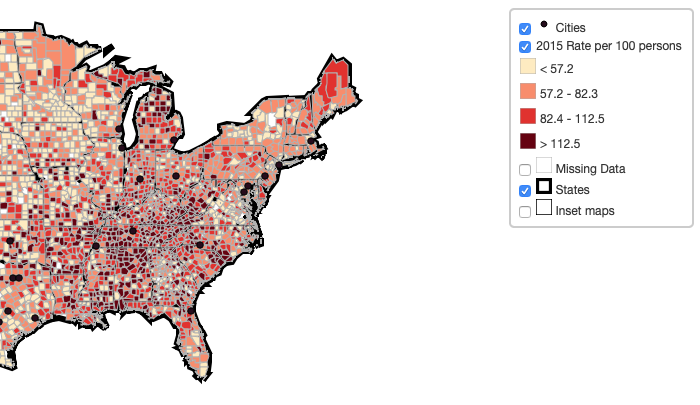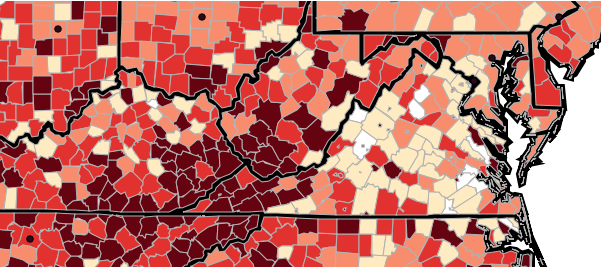by James C. Sherlock
Updated Jan 31 at 8:46 AM
Virginia’s Attorney General has offered a bill to create a new state bureaucracy to handle the opioid settlement money about to flow into the Commonwealth to support prevention, treatment, and recovery. It is going to be a lot of money. The state opioid settlements will not be the end of it. Federal money is coming for the same purpose.
The Attorney General wants a new state Opioid Abatement Fund (OAF) for the money and a new state Opioid Abatement Authority (OAA) to spend it. The AG admits he has no idea how much money will be available, yet his bill places constraints on how it may be spent and earmarks the distribution of the funds.
I disagree.
The Problem
According to the CDC, opioids—mainly synthetic opioids (other than methadone)—are currently the main driver of drug overdose deaths.
East of the Mississippi river, the legal product that kills is commercially produced opioids illegally prescribed and filled. They include:
- Natural opioids: Pain medications like morphine and codeine
- Semi-synthetic opioids: Pain medications like oxycodone, hydrocodone, hydromorphone, and oxymorphone
- Methadone: A synthetic opioid used to treat pain, but it can also be provided through opioid treatment programs to treat opioid use disorders.
Look below at the CDC map showing Opioid prescription dispensing rate and see the dark scar through the
Appalachians showing more than 112 prescriptions per 100 persons.

Then look at the closeup of Virginia below it. In the the city of Norton Va., (population 4,000) in Wise County, the rate was 568 prescriptions per hundred persons. In Salem (Roanoke County), 387 per 100, Martinsville, 375. The rest of the Virginia jurisdictions with more that one hundred opioid prescriptions per hundred persons were: Fredericksburg (233), Winchester (227), Scott County (169.4), Charlottesville (163.1), Galax (161), Emporia (125), Lexington (116), Lynchburg (105).

The illegal product that kills is Chinese fentanyl and Mexican heroin, both brought into the states by Mexican drug cartels.
As for the scope and rate of increase of the problem, according to the CDC, death rates for drug-induced causes per 100,000 population jumped from 6.9 to 21.7 between 1999 and 2018.
Virginia is in the middle third of the states in drug overdose death rate in 2017 – 2018 at over 400 and 326 respectively. But it was also one of 18 states that showed significant increases in non-fatal opioid overdoses between February 2019 and February 2020. The difference was major increases in reversal of overdoses to prevent death using Naloxone.
According to the CDC National Center for Health Statistics (NCHS), some of the highest death rates in America from these drugs, legal and illegal, are concentrated in Virginia’s Appalachian and Blue Ridge counties and cities.
Overall, opioid abuse is a national scourge, but disproportionately concentrated.
The Bills
Del. Charneille Herring, D-Alexandria, has introduced HB 2322 and Sen. George Barker, D-Alexandria, SB 1469, identical bills, to carry out the AG’s plan. It proposes a politically appointed commission to “establish criteria for awards, review applications, decide on the distribution of funds, and evaluate the implementation and results of awards.”
Overview :
The OAA will be led by a board consisting of 11 members: (1) the Secretary of Health and Human Resources; (2) the Director of Senate Committee on Finance and Appropriations; (3) the Staff Director of House Committee on Appropriations; (4) an elected member of a local governing body to be selected from a list of three submitted by VACo and VML; (5) a CSB representative from an urban or suburban region; (6) a CSB representative from a rural area; (7) a local sheriff; (8) a city or county attorney; (9) and (10) two medical professionals; and (11) one representative of the addiction and recovery community.
OAA will establish criteria for awards, review applications, decide on the distribution of funds, and evaluate the implementation and results of awards.
Awards can only be made for opioid-related items, but can include treatment and recovery programs, support for specialty court dockets, and a wide range of prevention measures.
OAA is required to give priority to applications that: (1) collaborate with an existing successful program; (2) support treatment or prevention in a community with a high incidence of opioid use disorder; (3) address opioid treatment in a historically economically disadvantaged community; and (4) include a monetary match from the locality.
Fund distribution earmarks: 15 percent to state agencies; 15 percent to localities; 35 percent to regional efforts; and, 35 percent is unrestricted.”
From the Richmond Times Dispatch :
“Officials from the Office of the Attorney General, which helped craft the legislation to create the authority, said there are no estimates available for how much money Virginia might get. But Michael Kelly, the attorney general’s chief of staff, said it could start coming in soon.”
“When that moment comes, we don’t want the Commonwealth to have to delay the spending or scramble to figure out what to do with the money,” he said in an email. “We are proposing this structure now so that if judgments or settlements materialize we can help get as much money out the door as quickly as possible to support prevention, treatment, and recovery.”
Perhaps we should ask why the AG thinks the government of Virginia would need to “scramble” to receive and spend the money instead of already having a plan. That money has been coming for years.
My Take
I propose it will be far more efficient and effective to use the structures the state already has in place for receiving money and spending it rather than starting over with a new commission. I hesitate to call this a proposal to set up a politically-controlled slush fund, but others may differ.
The AG and the State Police and local police and prosecutors should continue to enforce the laws.
A list of the worst offender pharmacies in Virginia is available from DEA’s Automated Reports and Consolidated Ordering System (ARCOS) to which manufacturers and distributors report their controlled substances transactions including with retail outlets.
I hope Virginia is fully on top of stopping the illegal distribution of legal drugs by physicians and pharmacies, but if additional funds are needed, request it.
As for street drugs, work with the DEA and jail the smugglers and distributors. Same answer as for illegal distribution of legal drugs. If more money is needed, request it.
Leave prevention, treatment and recovery to the Department of Health, whose responsibilities they already are.
The AG says we need a new commission. He thus backhandedly accuses VDH of not being up to the task. VDH is inevitably already working with CDC and attempting to employ CDC’s evidence-based strategies. If it needs more money, it can ask for it. VDH might not succeed, but then what chance does this new commission starting from scratch have?
I scoured Bureau of Labor Statistics (BLS) databases for Occupational Employment and Wages, May 2019, occupation 21-1023 Mental Health and Substance Abuse Social Workers (called workers going forward).
It turns out that Virginia as a state:
- has a higher concentration of such workers than the national average, and
- pays slightly more than the average for their services Mean Average Salary nationally $51,670 vs. Virginia $52,980.
But most of those workers are not where the problem is concentrated. And those that are there make far less money than elsewhere in the state.
In Virginia’s Washington suburbs, BLS reports there were 2,980 workers in 2019 who made an annual mean wage of $62,050. In Hampton Roads, 570 workers at an annual mean wage of $48,000. In non-metro Southwest Virginia, 290 at an annual mean wage of $39,020.
So, Virginia has negative wage incentives to get the workers that need to help to where they are needed.
All of those workers have college degrees, and all pay for those degrees. Most of them want to live and raise their families in the suburbs or cities. That is an issue with every medical profession. All are in short supply in rural America.
Thus we are going to have to provide significant monetary incentives to get the substance abuse treatment and recovery professionals from where they are to where they are needed. It doesn’t take a commission to figure that out.
And they need to be hired and managed by organizations that know how to make them comfortable and successful in their work. If the VDH does not have metrics on the success of such organizations, it should get some.
We absolutely cannot stand for the useless and endless debates that will occur in a commission about whether those organizations should be government, non-profit or commercial. Go online. That is what is being discussed in the wake of this story, not what should be done, but who should get the money.
A commission tasked with spending the money will certainly do so. Nothing else is assured. A few of the questions to be answered are:
- Are Commissioners from other parts of the state going to vote to send most of the money to Appalachia?
- Are they going to be pressured by big donors who have formed brand new companies to absorb the money flow?
- Will it have a staff? How big? From where will they come? How much will that cost?
- How will the Commission deal with the hot online debate about whether it should send money to government, non-profit or commercial organizations?
- How much staff time will be spent in coordination with the Department of Health?
I strongly recommend the General Assembly put the money in the General Fund and use the budget processes and government organizations in place to spend it.
One argument against that is that the Governor and General Assembly are too undisciplined to avoid using the money for other purposes. The AG clearly concurs.
Okay, then be disciplined; use the system as it exists.
And kill the bills.

Leave a Reply
You must be logged in to post a comment.